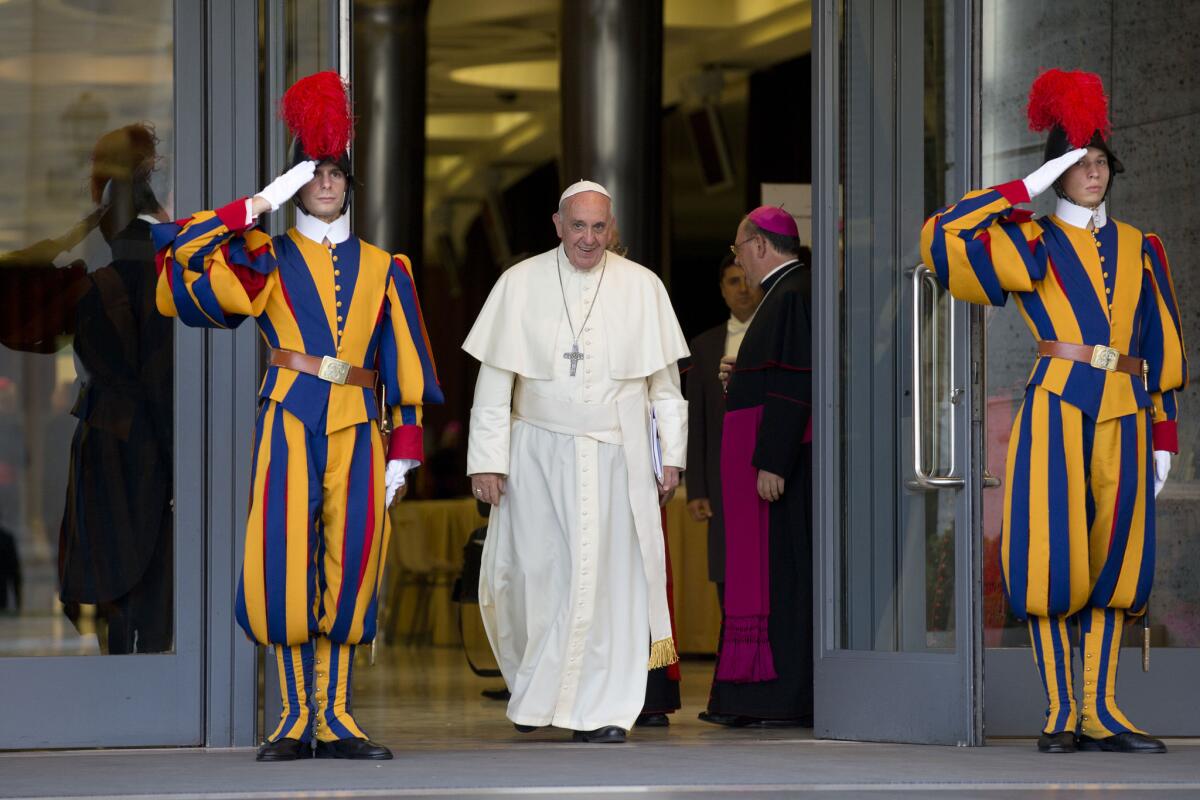Op-Ed: Pope Francis’ extraordinary outreach to bishops

- Share via
Speculation abounds about what earthshaking changes might come out of the Roman Catholic Church’s Extraordinary Synod of Bishops on the Family now underway in Rome: Will the bishops change the church’s approach to divorced and remarried Catholics and somehow readmit them to Communion? Will they discuss the worldwide survey that found that most Catholics do not accept the church’s ban on birth control, and if so, will they modify that ban? Will the bishops react to the impression that the church speaks in a way that is unnecessarily condemnatory of same-sex attraction and find a way to be more welcoming to our gay brothers and sisters?
In fact, those questions miss the point, at least for now. This meeting is preliminary. It only starts a process that is meant to continue through the Ordinary Synod of Bishops, scheduled for 2015. (“Synod” means “coming together” in Greek.)
But that does not mean that the meeting that began Oct. 5 won’t shake things up in an important way. It already has, by signaling a break in the strictly top-down rule of modern Catholicism, as Pope Francis reaches out to the wider church.
For most of its history, the Roman Catholic Church clarified its teachings at regional (synodal) or worldwide (ecumenical) meetings of bishops. It was primarily “conciliar,” its teachings expounded by councils, not by a centralized papal bureaucracy.
This was true from the very start of Christianity, when the apostles met in Jerusalem to decide whether those who professed faith in Christ also had to accept the practices of the Jewish faith, such as restrictions on food and circumcision — that last a difficult proposition for adult male converts. Paul reports on this meeting in Galatians 2:1-10, and Luke describes it in Acts 15:1-22. (The outcome? Jewish law would be respected but not required.)
From Nicea in 325 to Trent in 1545, the church held 19 ecumenical councils. But since Trent, there have been just two: Vatican I in 1869 and Vatican II in 1962, as authority in the church coalesced in the papacy and its bureaucracy, the Roman Curia, a trend that intensified after Vatican I established the doctrine of papal infallibility.
Then, in the 1960s, John XXIII convened the Second Vatican Council. The bishops who were present in the nave of St. Peter’s so strongly felt God’s presence, the Holy Spirit, guiding the church through the gathering that they wanted to see such meetings continue. They knew full ecumenical councils would be too large, cumbersome and expensive to hold on a regular basis, so they proposed a sort of mini-council made up of elected bishops to help guide the church.
Unfortunately, when Pope Paul VI created the Synod of Bishops in 1965, he kept for himself the right to call its meetings, to appoint members in addition to those chosen by the bishops, to decide its agenda and to write up its results. The synod was not so much a teaching event in its own right as an adjunct of the papacy.
And a dreadfully dull adjunct at that. There have been 25 meetings between 1965 and 2014, and anyone who was at the synods convened by Paul VI, John Paul II and Benedict XVI can tell you that most were stage-managed affairs in which the opinions of the bishops in attendance were never really sought.
But when Francis’ Extraordinary Synod opened last week, much was different. He commissioned the survey of the faithful in 2013 to establish the topics the bishops would discuss. Such grass-roots input into a synod was unheard of.
And then Francis made his welcoming remarks at a lunch on Monday. He told the bishops to say forthrightly what was on their minds: “You have to say all that which in the Lord you feel you have to say; without human respect, without timidity. And, at the same time, you must listen with humility and accept with an open heart what your brothers say. Synodality is exercised with these two attitudes.”
Such an approach returns the church to its ancient roots, in which the world’s bishops are again meaningful participants in establishing church teachings. It portends, over time, real movement on the searching questions of remarriage after divorce, birth control and acceptance of gay people.
But make no mistake, the biggest change has already occurred: A modern pope has told the bishops, and the world, that he trusts them to sense the Holy Spirit and to say what they hear the Spirit whispering — no matter where it leads.
Nicholas P. Cafardi is a canon lawyer and a professor at the Duquesne University School of Law, where he is also dean emeritus.
Follow the Opinion section on Twitter @latimesopinion
More to Read
A cure for the common opinion
Get thought-provoking perspectives with our weekly newsletter.
You may occasionally receive promotional content from the Los Angeles Times.






